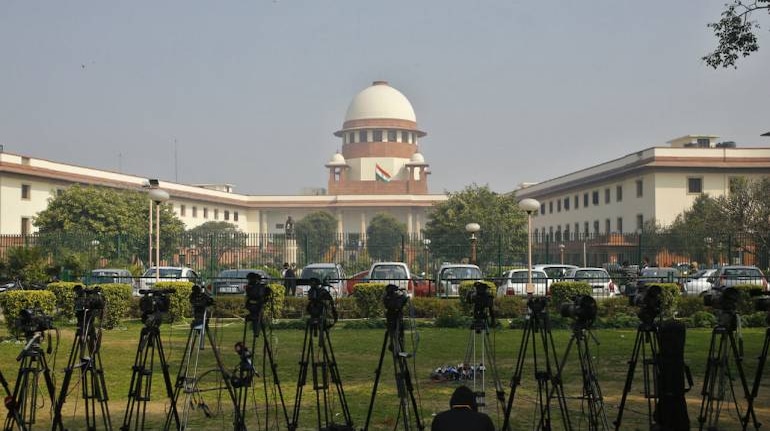



The nation-wide lockdown, in response to the coronavirus pandemic, has thrown up questions about the judiciary that were so far brushed under the carpet.
Take, for instance, undertrials in prisons. Many states have been mulling measures to temporarily release undertrials accused of petty offences for the reasons that over-crowded prisons had the potential to become mass-spreaders of the virus; jails are reportedly currently filled to 117 percent of its capacity. The question then asks itself — if yet-to-be convicted petty offenders can be granted bail now, why could they have not been granted the same earlier, when there was no crisis?
Similarly, there has been a lot of noise around the Supreme Court and high courts hearing cases through video conferencing. While that is certainly a great first step, the cases taken up are few and far between, doesn’t appear to be scalable, and reserved only for the most urgent of cases. In fact, so typically of Indian courts, whether a bail plea was of the ‘most urgent’ nature itself was litigated immediately after, with the apex court staying a Rajasthan High Court decision to not list bail pleas as it was not an ‘extremely urgent matter’.
The fact is our courts were never prepared, or for that matter, never imagined the need to prepare, for such a prolonged lockdown. Worse, without a more professional approach, the lessons learnt from this crisis will remain on paper.
On April 6, the Supreme Court passed fresh directions to high courts to make arrangements for hearing cases through videoconferencing. So far, it is a temporary measure, and is highly unlikely to continue once the lockdown is lifted. For one, the courts have consistently dragged their feet when it comes to embracing technology. Just as importantly, our present way of functioning is not easily transposed into the virtual world. Video conferencing facility is available in several district courts to accommodate witnesses and parties whose presence is necessary, but are geographically distant; it hasn’t taken off in a big way yet.
It was in July 2018 that the Supreme Court, in response to a petition filed by senior advocate Indira Jaising, decided that hearings of important constitutional cases must be streamed online. Then some time last year, in response to problems of overcrowding of courtrooms, the courts agreed to consider setting up a remote viewing location, so that casual watchers can follow court proceedings without crowding the courtrooms. In January, the apex court hearing an application seeking implementation of the judgment in Jaising’s case, took the case on board, where it still remains. None of these saw actual implementation till the virus forced the courts to embrace the idea of online dispute resolution.
Then there is the irrepressible reliance on physical copies. For example, the Delhi High Court, and more lately the National Company Law Tribunals, had introduced the e-courts system some while ago. However, essentially you are filing a physical copy, which is then scanned and uploaded by the court registry — a process that is unwieldy. One does not expect filings to go completely and truly online.
 What about physical hearings. Will a lawyer sitting in Chennai be able to argue before the Supreme Court through video conferencing? Today, during the lockdown, that is permissible. However, general consensus is that the entrenched lobby of court specific lawyers will likely oppose this tooth and nail — and prevail.
What about physical hearings. Will a lawyer sitting in Chennai be able to argue before the Supreme Court through video conferencing? Today, during the lockdown, that is permissible. However, general consensus is that the entrenched lobby of court specific lawyers will likely oppose this tooth and nail — and prevail.
One of the biggest reasons for the inertia is the fact that both at the Supreme Court and high courts, administrative decisions are taken by committees of judges. Judges are not known (nor should they be judged) for their administrative acumen. Yet, judges of every high court are saddled with responsibility for decision-making as part of several committees. A study last year had found that at the Allahabad High Court, about 270 posts in total (on 80 committees) were distributed among the 70 judges of the court.
Many have openly mooted professional management of the higher judiciary. Needless to say, that is opposed on the grounds that it would impinge on the independence of the judiciary. It needn’t. A professional CEO who reports to, advises, and is charged with executing decisions taken by the Chief Justice might only help better navigate the challenges of a justice system that is bursting at the seams in terms of pendency, and woefully underprepared to manage black swan events such as the current COVID-19 pandemic.
Abraham C Mathews is an advocate based in Delhi. Twitter: @ebbruz. Views are personal.
This is the sixth article in a multi-part series, World After COVID-19, which looks at the probable developments in various sectors: macro economy, trade, healthcare, agriculture, judiciary, international politics and sports.
Discover the latest Business News, Sensex, and Nifty updates. Obtain Personal Finance insights, tax queries, and expert opinions on Moneycontrol or download the Moneycontrol App to stay updated!
Find the best of Al News in one place, specially curated for you every weekend.
Stay on top of the latest tech trends and biggest startup news.